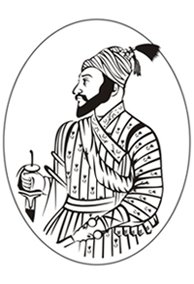It is one of the famous incidents doing as much proud to Shivaji as to his followers who served him with total devotion. Within about 18 days of Afzal Khan's death, Shivaji captured Panhala, the capital of the Western Bijapuri district. Within a short time the surrounding districts of Kolhapur and Vasantgarh, Khelna (re-named Vishalgad by Shivaji), Rangna and some other minor forts also surrendered to him.
When Shivaji was in Panhala, he was besieged by Salabat Khan (Siddi Jauhar), and Fazl Khan (Afzal Khan's son), commanding Bijapuri troops. After nearly five month's long siege, Shivaji found himself in a fatal trap. On a dark night (13th July 1660), when it was raining heavily, Shivaji, leaving a part of his forces to hold Panhala fort as long as possible, slipped out of the fort through the back gate with a small body of `troops and made way for Vishalgad, but was detected and hotly pursued by a strong Bijapuri force under Fazl Khan, Siddi Halal etc. Shivaji had to cover 27 miles to reach Vishalgad where he would be safe.
Though he marched all night, Shivaji was hopelessly outnumbered, hotly pursued by Bijapuri troops carrying mahtabs for light. Fortunately the hilly road led through a narrow pass known as Ghod Khind (horse ravine) at the eastern entrance of Vishalgad, where a few men could hold at bay a large force.
Baji Prabhu, the Deshpande of Hirdas Maval, volunteered to defend the mouth of the pass with half the troops till Shivaji should reach Vishalgarh and signal his safe arrival there by gun fire.
Baji Prabhu and his heroic band fought with exemplary valour, beating back three vigorous assaults. He breathed his last only after he had heard the gun-fire informing Shivaji's safe arrival in Vishalgarh.
In the next sketch, the brave defence put up by Baji Prabhu at the mouth of the pass is shown. Shivaji with a small band, after escaping from the back-door of Panhala fort, has crossed the pass and can be seen galloping fast towards the ascent of Vishalgad. In another section of the sketch, the salvo of a gun from Vishalgad informs the fatally wounded Baji Prabhu of the safe arrival of Shivaji. The sacrifice of Baji Prabhu "is gratefully remembered to this day by the Maratha nation and is typical of the way in which Shivaji was served throughout his career".
When Shivaji was in Panhala, he was besieged by Salabat Khan (Siddi Jauhar), and Fazl Khan (Afzal Khan's son), commanding Bijapuri troops. After nearly five month's long siege, Shivaji found himself in a fatal trap. On a dark night (13th July 1660), when it was raining heavily, Shivaji, leaving a part of his forces to hold Panhala fort as long as possible, slipped out of the fort through the back gate with a small body of `troops and made way for Vishalgad, but was detected and hotly pursued by a strong Bijapuri force under Fazl Khan, Siddi Halal etc. Shivaji had to cover 27 miles to reach Vishalgad where he would be safe.
Though he marched all night, Shivaji was hopelessly outnumbered, hotly pursued by Bijapuri troops carrying mahtabs for light. Fortunately the hilly road led through a narrow pass known as Ghod Khind (horse ravine) at the eastern entrance of Vishalgad, where a few men could hold at bay a large force.
Baji Prabhu, the Deshpande of Hirdas Maval, volunteered to defend the mouth of the pass with half the troops till Shivaji should reach Vishalgarh and signal his safe arrival there by gun fire.
Baji Prabhu and his heroic band fought with exemplary valour, beating back three vigorous assaults. He breathed his last only after he had heard the gun-fire informing Shivaji's safe arrival in Vishalgarh.
In the next sketch, the brave defence put up by Baji Prabhu at the mouth of the pass is shown. Shivaji with a small band, after escaping from the back-door of Panhala fort, has crossed the pass and can be seen galloping fast towards the ascent of Vishalgad. In another section of the sketch, the salvo of a gun from Vishalgad informs the fatally wounded Baji Prabhu of the safe arrival of Shivaji. The sacrifice of Baji Prabhu "is gratefully remembered to this day by the Maratha nation and is typical of the way in which Shivaji was served throughout his career".

